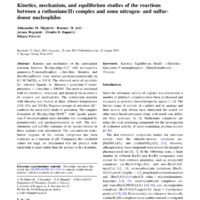Kinetics, mechanism, and equilibrium studies of the reactions between a ruthenium(II) complex and some nitrogen- and sulfur-donor nucleophiles
Објеката
- Тип
- Рад у часопису
- Верзија рада
- објављена верзија
- Језик
- енглески
- Креатор
- Aleksandar M. Mijatović, Ratomir M. Jelić, Jovana Bogojeski, Živadin D. Bugarčić, Biljana Petrović
- Извор
- Monatshefte für Chemie - Chemical Monthly
- Издавач
- Springer Science and Business Media LLC
- Датум издавања
- 2013
- Сажетак
- Kinetika i mehanizam reakcija supstitucije između [Ru(trpi)(bpi)Cl]+ sa nukleofilima gvanozin-5′-monofosfatom, L-histidinom, tioureom i dimetilsulfoksidom proučavani su spektrofotometrijski u 0,1 M NaClO4 na 310 K. Red reaktivnosti za odabrane ligande je: tiourea > gvanozin-5′-monofosfat > L-histidin > DMSO. Ovaj red je povezan sa elektronskim, strukturnim i hemijskim karakteristikama kompleksa i nukleofila. Reakcija supstitucije sa tioureom je proučavana na tri različite temperature (288, 298 i 310 K). Negativna entropija aktivacije DS = potvrđuje asocijativni način aktivacije. Formiranje kompleksa [Ru(trpi)(bpi)H2O]2+ sa ligandima gvanozin-5′-monofosfat i L-histidin je takođe ispitivano potenciometrijom i spektrofotometrijom. Određene su stehiometrija i konstante stabilnosti vrsta koje se formiraju u ovim sistemima. Dijagram raspodele koncentracije različitih kompleksa je procenjen kao funkcija pH. Upoređujući izračunate vrednosti za logb, utvrdili smo da je proizvod sa nukleotidom stabilniji od proizvoda sa L-histidinom.
- Kinetics and mechanism of the substitution reactions between [Ru(trpy)(bpy)Cl]+ with nucleophiles guanosine-5′-monophosphate, L-histidine, thiourea, and dimethylsulfoxide were studied spectrophotometrically in 0.1 M NaClO4 at 310 K. The observed order of reactivity for selected ligands is: thiourea > guanosine-5′-monophosphate > L-histidine > DMSO. This order is associated with the electronic, structural, and chemical characteristics of complex and nucleophiles. The substitution reaction with thiourea was studied at three different temperatures (288, 298, and 310 K). Negative entropy of activation ΔS ≠ confirms the associative mode of activation. The complex formation of [Ru(trpy)(bpy)H2O]2+ with ligands guanosine-5′-monophosphate and L-histidine was investigated by potentiometry and spectrophotometry as well. The stoichiometry and stability constants of the species formed in these systems were determined. The concentration distribution diagram of the various complexes has been evaluated as a function of pH. Comparing the calculated values for logβ, we determined that the product with nucleotide is more stable than the product with L-histidine.
- том
- 144
- Број
- 10
- почетак странице
- 1489
- крај странице
- 1498
- doi
- 10.1007/s00706-013-1044-1
- issn
- 0026-9247
- Subject
- Kinetika, Ravnoteža, Ru(II), L-Histidin, Guanozin-5' -monofosfat, Dimetilsulfoksid, Tiourea
- Kinetics, Equilibrium, Ru(II), L-Histidine, Guanosine-5' -monophosphate, Dimethylsulfoxide, Thiourea
- Шира категорија рада
- M20
- Ужа категорија рада
- М22
- Права
- Отворени приступ
- Лиценца
- Creative Commons – Attribution-NonComercial-No Derivative Works 4.0 International
- Формат
- Медија
 s00706-013-1044-1.pdf
s00706-013-1044-1.pdf
Aleksandar M. Mijatović, Ratomir M. Jelić, Jovana Bogojeski, Živadin D. Bugarčić, Biljana Petrović. "Kinetics, mechanism, and equilibrium studies of the reactions between a ruthenium(II) complex and some nitrogen- and sulfur-donor nucleophiles" in Monatshefte für Chemie - Chemical Monthly, Springer Science and Business Media LLC (2013). https://doi.org/10.1007/s00706-013-1044-1 М22
This item was submitted on 9. децембар 2021. by [anonymous user] using the form “Рад у часопису” on the site “Радови”: http://drug.rgf.bg.ac.rs/s/repo
Click here to view the collected data.